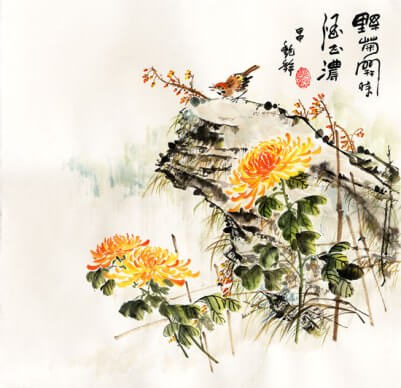Composing Chrysanthemum After Failing The Imperial Examination
- Poetry of Huang Chao

Waiting for autumn to come, eighth of the ninth month,
Once my flowers bloom, hundred flowers perishes.
Bursts of fragrance soars the skies as it penetrates Chang’an,
The entire city coated in golden armoury.
The eighth of the ninth month is a day before the nine-nine festival or Chongyang Festival, where there is the custom to climb mountains and admire chrysanthemum flowers which blooms in the autumn season.
During this season, particularly the season of the nine-nine festival, chrysanthemums are seen everywhere, golden armoury refers to the colour of the flower. Chrysanthemums holds great symbolism in Chinese culture, particularly in arts [additional note: it represents autumn amongst the Four Noble Ones], as it is able to rise amongst the howling winds and stands strong whilst other flowers falls, it holds such valiant and heroic image, and also portrays the poet’s heroism in waiting for an opportunity to change the world. Similarly, when the rebel army enters Chang’an dressed in battle armoury, sparkling gold under the sun, is this not heroic spirit soaring the skies?
待到秋来九月八,我花开后百花杀。
冲天香阵透长安,满城尽带黄金甲。
- Why Chinese poems is so special?
- The most distinctive features of Chinese poetry are: concision- many poems are only four lines, and few are much longer than eight; ambiguity- number, tense and parts of speech are often undetermined, creating particularly rich interpretative possibilities; and structure- most poems follow quite strict formal patterns which have beauty in themselves as well as highlighting meaningful contrasts.
- How to read a Chinese poem?
- Like an English poem, but more so. Everything is there for a reason, so try to find that reason. Think about all the possible connotations, and be aware of the different possibilities of number and tense. Look for contrasts: within lines, between the lines of each couplet and between successive couplets. Above all, don't worry about what the poet meant- find your meaning.